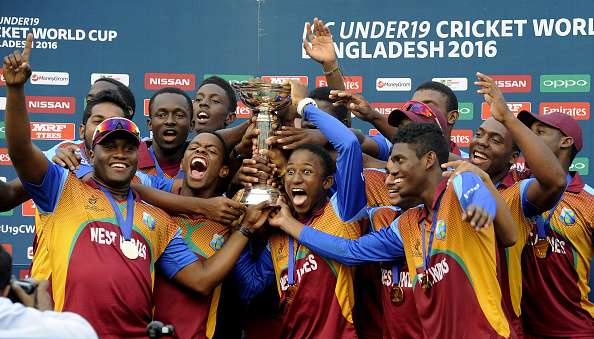Tim Wigmore analyses the legacy of the West Indies U19 triumph
When Keemo Paul, a 17-year-old from Guyana, top-edged a delivery over the keeper’s head, the entire West Indies squad ran onto the outfield in jubilation. And with good reason: they had just won the U19 World Cup.
Here was a welcome glimpse of a once ubiquitous species that many had feared extinct: the triumphant West Indies cricket team. True, it was only an U19 tournament, but so seldom has Caribbean cricket recently had cause for cheer that no one was complaining.
It feels almost churlish to point out that the hopes after the U19s’ success – that West Indies cricket will become more united, and focus on defeating other countries rather than the enemy within – were widely expressed after the West Indies won the Champions Trophy in 2004 and the World T20 in 2012.
Whatever happens next, the exuberance of the West Indies U19s has provided a reminder that the collapse of Caribbean cricket is not inevitable. For all the hyperbolic fears that basketball and football are the only sports the Caribbean youth of today know, the West Indies can still produce formidable talent.
While the tournament was held in Bangladesh, this was a success built upon the Caribbean’s traditional strength: fast bowling. The two opening bowlers, Alzarri Joseph and Chemar Holder, are from the classical Caribbean tradition: tall, quick and with a penchant for brutish short deliveries. The Antiguan Joseph is particularly impressive: he took 13 wickets at 13.76 in the tournament, and was declared “ready” for higher honours by Ian Bishop. It might not be too long before Joseph appears in a Test match: he already has 17 wickets at 20.76 in his nascent first-class career.
But, for all the talent shown by the West Indies U19 side, the senior side has repeatedly proved that talent alone is not enough. It counts for nothing if those with it do not make it onto the pitch.
During the West Indies’ humbling recent tour to Australia, six Caribbean players were in the country playing in the Big Bash instead. After Darren Sammy claimed the side faced an 80 per cent pay cut compared to previous World T20 events, there were fears that the West Indies squad would pull out of next month’s WT20.
That has not materialised, but the West Indies Board retains a terrible relationship with many players. Unless that is rectified, the West Indies will only rarely be able to pick their strongest team.
The West Indies’ dysfunctional administration is largely to blame. This is nothing new. Reflecting on his time as ICC president, between 2000 and 2003, Malcolm Gray observed: “The West Indies was a bit of a microcosm of the ICC. You’ve got these competing nations trying to act cooperatively as one, and often it didn’t work. I can remember going to the West Indies with Malcolm Speed and meeting with their boys to try and change things, but it was a pretty fruitless exercise.”
Since Gray’s time, the WICB had become more byzantine. The dysfunctional state of the WICB prompted CARICOM to conduct an independent report into West Indies cricket last year.
The report found that the WICB was “obsolete” and called for its immediate dissolution. You can guess what happened next: Dave Cameron, the president of the WICB, said that the report “was not supported by the facts” and it has been ignored.
Caricom’s findings were nothing new: they largely echoed reports from Deloitte, in 2010, and PJ Patterson, the former Prime Minister of Jamaica, in 2007. So enraged was Patterson by the WICB arrogantly ignoring the findings that he now fumes about wasting three years of his life on the report.
Meaningful improvement in the West Indies team is unlikely while the WICB remains impervious to reforming. But at least, under director of cricket Richard Pybus, some significant changes have been made to domestic cricket. From 2014/15, 90 professional contracts were introduced: finally, domestic players are full-time cricketers. The first-class season has also been extended from a minimum of six games per team to ten, providing players with more exposure against the red ball before making the step up to Test cricket.
But fundamental problems remain: Caribbean pitches remain slow and unconducive to fast bowling and lamentable preparation for Test matches; the A team, which should bridge the gap between domestic and international cricket, has not played for 18 months.
While the 16 nations and territories that make up the West Indies must cease to be a house divided, they could also do with greater support from the ICC.
The West Indies is a poor region of fewer than six million people. As a result, its commercial deals seem pitiable set against those of New Zealand, never mind the Big Three. But the West Indies are further handicapped by the inequitable division of funds to Full Members of the ICC: the reforms of 2014 will cost the WICB $43 million between 2015 and 2023, according to the former president Patrick Rousseau. Rather than funding grassroots cricket in the Caribbean, that money now goes to Australia, England and India instead.
But BCCI president Shashank Manohar’s reformist zeal at the ICC could have huge benefits for the West Indies.
Manohar has reportedly said that he wants to return six per cent of India’s sum to the ICC pot, recognising that “you cannot make the poor poorer and the rich richer, only because you have the clout” and “if you do not have a fierce competition, the broadcasters are not going to pay you and the sponsors are not going to sponsor your events”.
Just as significantly, the ICC is also conducting a review into the structure of international cricket.
This is much more than a tedious bureaucratic exercise. It represents an attempt to grapple with the club v country conflict engulfing cricket, preventing leading Caribbean players having to choose between foreign t20 leagues and international cricket.
If the ICC can agree something meaningful – ideally windows for domestic t20 and international cricket, to avoid clashes between the two – then West Indies players will no longer have to miss out on cash by playing for their country.
In the years ahead, Joseph and several other members of the U19 World Cup winning side might become cricketing stars. It is up to the ICC and WICB to ensure they make their names playing for the West Indies, and not merely franchise t20 sides.
This piece originally featured in The Cricket Paper, Friday February 26 2016















